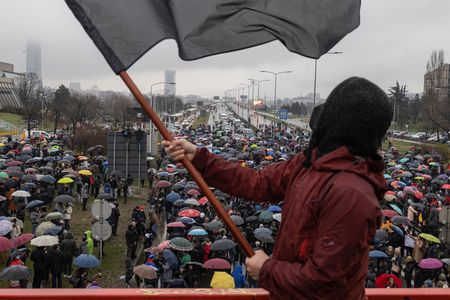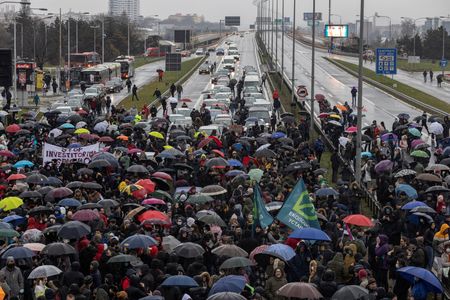BELGRADE (Reuters) – Hundreds of people in Serbia braved sleet and cold weather to block roads across the country for the third straight weekend on Saturday to protest government plans to allow Rio Tinto’s open a lithium mine.
To bolster economic growth, Serbia’s government has offered mineral resources to foreign investors including China’s Zijin copper miner and Rio Tinto.
Green activists say the mining projects will pollute land and water in the Balkan country which is already heavily scarred by industrial pollution.
The protests have become a headache for the ruling coalition ahead of April 3 general elections.
After the first weeks of protests, conservative President Aleksandar Vucic sent an expropriation law, contested by green groups, which allowed swift acquisition of property by the state, back to parliament for reworking.
On Friday, parliament also introduced amendments to a referendum law, including the removal of a requirement for payments of fees by civic groups to launch referendum initiatives.
Critics said the two laws were have been pushed through to ease construction of the mine.
But that does not go far enough, said Aleksandar Jovanovic Cuta, head of the Ecological Uprising civic organisation.
“There will be no respite until Rio Tinto is expelled from Serbia and until lithium mining … is banned permanently,” he told reporters.
Protesters brought traffic to a standstill along a highway in the Novi Beograd neighbourhood and scuffled with a driver who attempted to plough his way through.
“We (must) defend ourselves from these crazy projects which are envisioning construction of tens of mines in Serbia,” said Irena Radovanovic, a student from Belgrade.
Lithium is in big global demand as a vital ingredient in batteries for electric cars, while another expected mining product, borates, is used in solar panels and wind turbines.
Rio has promised to adhere to all domestic and EU environmental standards, but environmentalists say the planned $2.4 billion mine in Serbia would irreversibly pollute drinking water in the area.
(Reporting by Aleksandar Vasovic; Editing by Ros Russell)












